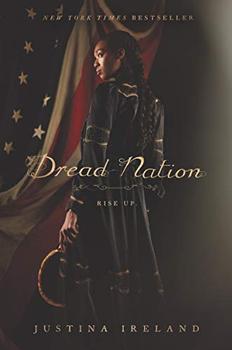Summary | Excerpt | Reviews | Beyond the book | Read-Alikes | Genres & Themes | Author Bio

The war between the states is over and, instead, a very different battle is being waged for the future of the United States – or at least it is in the stunning, complex and adventurous Dread Nation by Justina Ireland. Slavery may be over, but Native Americans and Black people are subject to the Native and Negro Reeducation Act (NNRA), which sends them to government run schools to defend white people in the eastern cities from the rising undead. Yes, here the dead don't stay dead, and the newly "freed" of the post-Civil War nation are sent onto the front lines to put the shamblers – zombies that began to rise first from the battlefields of Gettysburg – down again for good. Jane McKeene, who is mixed race, was sent from her home to Miss Preston's school for attendants to do just that. While there, she discovers that not everything is as it seems. Jane and two unexpected friends – Jackson, known as Red Jack, and Katherine (never Katie) Deveraux – navigate danger political scandals, and the ever-suppressive racially driven dynamics that shape their lives in a way that resonates with modern discussions on similar topics.
The political commentary is deliberate and is both executed and framed well by Ireland. She opens with an author's note discussing this work as a response to what she found implausible in other period-novel rewrites featuring zombies – in her words, "How could women who didn't even dress themselves suddenly become zombie-fighting machines?" However, she goes on to specifically frame the novel as a response to the murder of Mike Brown in Ferguson, Missouri in 2014, and how that moment changed how many in America viewed the value of others' lives. Where the politicization of the narrative might have become heavy-handed, the alternative history helps to mitigate that. Ireland weaves concern into her characters about who is a fully enfranchised human, whose right to self-determination depends on the whims of others, and the explicit and implicit power dynamics of race relations. They represent various experiences of blackness or otherness in the United States without becoming static representations of those experiences. Her characters are mixed race, of different social backgrounds and life experiences, and embody varied anxieties about the lack of control they have over their futures in a way that feels genuine and approachable.
In addition to the socio-historical context of the content, the writing itself is dynamic, moving between Jane's first-person narration and fragments of letters written between Jane and her mother which feed the backstory of the main narrative without being distracting. The narrative arc is intriguing and brings the heroines in contact with different forms of systematic oppression that they have to manage to survive within. While Jane and Katherine feel approachable as characters, sometimes some of the peripheral characters can feel a touch flat alongside of them.
The combination of period drama, alternative timelines, fantasy elements, zombies and complex socio-historical-cultural contexts makes this novel a welcome departure from other contemporary genre-specific young adult books. Ireland proves that it is possible to write a rollicking fantasy filled with zombies and brave zombie fighters, and also provide readers with substance and thoughtful material that challenges them to re-evaluate how they see the world. Above all, despite, or perhaps, because of its setting, it demands that we ask of our society, if people are not seen as humans, equal under the law and with the same rights to their humanity and personhood, then are they really free?
![]() This review was originally published in The BookBrowse Review in May 2018, and has been updated for the
July 2019 edition.
Click here to go to this issue.
This review was originally published in The BookBrowse Review in May 2018, and has been updated for the
July 2019 edition.
Click here to go to this issue.

If you liked Dread Nation, try these:

by Cebo Campbell
Published 2025
In a world without white people, what does it mean to be black?

by Soyoung Park, Joungmin Lee Comfort
Published 2025
In a world of constant winter, only the citizens of the climate-controlled city of Snowglobe can escape the bitter cold—but this perfect society is hiding dark and dangerous secrets within its frozen heart. A groundbreaking Korean novel translated into English for the first time!
Your guide toexceptional books
BookBrowse seeks out and recommends the best in contemporary fiction and nonfiction—books that not only engage and entertain but also deepen our understanding of ourselves and the world around us.